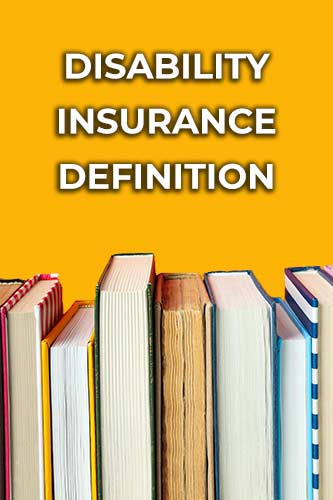
Looking up a disability insurance definition should be simple, right? But there are multiple programs and coverage types that you’ll hear referred to as “disability insurance.” They’re very different, so finding the right definition matters. We’ll clear up the most common misconceptions below, including the difference between government and non-government programs.
➡️ Want to talk to a real person about protecting your income with disability insurance? We can help! Call us at (800) 823-4852 or click the button below to request a free quote.
Request a Free QuoteDisability Insurance Definition #1: Government Programs
Government disability benefits are often called “insurance.” But a better word would be “program,” because government benefits aren’t like your car insurance, health insurance, or any other common type of coverage. The government offers two programs for people who are disabled. Both are intended for people who experience disabilities severe enough to keep them out of work for at least a year. They are:
- Social Security Disability Insurance (SSDI). This program is funded through payroll taxes. If you’ve worked and paid into the system for the minimum required number of years and hours, you are eligible to apply. There are additional medical criteria you need to meet in order to actually receive benefits.
- Supplemental Security Income (SSI). If you experience a qualifying disability, qualify for SSDI, and also have limited income, SSI is an additional source of financial aid. It’s a need-based form of aid, not available to everyone. For this reason, you won’t see it referred to as “insurance.”

SSDI is called “insurance” even though you didn’t buy it through an agent, don’t get monthly statements, or take steps to renew your coverage. “Insurance” in this case means a safety net, rather than an individual policy. So if you had government benefits in mind when you started searching for a disability insurance definition, start with SSDI. You can find more information about the program on SSA.gov.
➡️ Want to talk to a real person about a non-government solution for disability insurance? We can help! Call us at (800) 823-4852 or click the button below to request a free quote.
Request a Free QuoteDisability Insurance Definition #2: Private Policies
Government programs aren’t the only type of disability insurance.
Private disability coverage is also available. You may hear it referred to as “disability income insurance” to distinguish it from government programs. It’s a more traditional type of insurance, just like your car or health insurance. Disability insurance pays you if you get sick or hurt and can’t work. It protects you when you’re at your most vulnerable – when you’re unable to work. If you looked up a disability insurance definition to find an alternative to government programs, this is what you were looking for.

Many people don’t know this type of policy even exists, and they assume government programs are all that’s available to them. That’s simply not true. You can take control of your coverage and protect yourself with a policy you own that’s not dependent on the government.
Here’s how disability income insurance works:
- Get a free quote. We can help with that! Our licensed agents will ask a few questions about your current job, current income, how much income you want to replace if you become disabled, and how long you want those payments to continue. All these factors will affect the price of coverage.
- Buy a policy. From the quotes we provide, select the policy that best meets your needs. Your policy will be in effect as soon as you make the first payment. Keep your policy documentation handy, since it will have information on covered conditions and what to do if you experience any of them.
- Experience a disability? Sit out the waiting period. Every insurer will have a waiting period before paying out benefits. These range from 30-120 days, and is often one of the features you can select when you buy the policy. This time is needed to make sure your disability is really severe enough for a claim, as well as to give you time to see a doctor and get their sign-off for your claim.
- File a claim. Your insurance policy will include instructions for filing a claim, whether that’s on paper or electronically. In most cases, as long as your doctor agrees that you have a covered disability, that claim will be paid in 4-6 weeks.
- Use that money for anything you need. Whether it’s rent, food, medical bills, or hiring a home health aide to help with your recovery, there are no limitations on what you can do with your cash payout.

➡️ Need more help than a disability insurance definition can give you? We can help! Call us at (800) 823-4852 or click the button to get started right away.
Request a Free QuoteShould You Buy Your Own Policy or Rely on Government Benefits?
That’s a question only you can answer. But we do have a few points for you to consider first:

Similarities: Government Programs and Private Coverage
- Only a percentage of your income will be replaced. There is no existing program that will pay you 100% of your pre-disability income, government-based or otherwise.
- Both require you to be under a doctor’s care and have a physician’s sign-off that you are disabled in a way that meets the program’s minimum requirements.

Difference: Government Programs and Private Coverage
- Unlike private insurance, government claims are rejected more often than not. 65% of government claims were rejected the first time, as of 2022.* The appeals process can be long and expensive, often requiring legal aid.
- Government programs require you to be unable to work in any job field in order to receive benefits. Private insurance often only requires that you be unable to work full-time in your pre-disability job field.
- Government benefits require you to prove (with a doctor’s help) that you’ll be disabled for at least a year. Private insurance offers short-term policies that can pay out if your disability will last more than 30 days. The catch? You need to have that private policy in place before you experience a disability.
The difference? It comes down to what you’re looking for. If you want:
- More flexibility, faster approvals, an easier claims process: private disability insurance is going to give you all these things, for a yearly total of 1-2% of your current income.
- No monthly payments: government programs are the cheapest option since you’ve already paid into them via payroll taxes.

➡️ Need more help than a disability insurance definition can give you? We can help! Call us at (800) 823-4852 or click the button to get started right away.
Request a Free Quote*”Social Security Disability Approval Rates by State and Hearing Office,” Atticus.com, accessed 9/12/23
